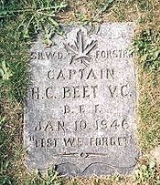
Harry Churchill Beet
Encyclopedia
Harry Churchill Beet VC
(1 April 1873 – 10 January 1946) was an English
recipient of the Victoria Cross
, the highest and most prestigious award for gallantry in the face of the enemy that can be awarded to British
and Commonwealth
forces.
Beet was 27 years old, and a corporal
in the 1st Battalion, Derbyshire Regiment, British Army
during the Second Boer War
when the following deed took place on 22 April 1900 at Wakkerstroom
, South Africa
, for which he was awarded the VC:
He later achieved the rank of Captain. He later emigrated to Saskatchewan
, Canada, where he fought with the Canadian Expeditionary Force
in World War I. In 1936 he settled in Vancouver
where he remained until his death.
His Victoria Cross is displayed at the Sherwood Foresters Museum, The Castle, Nottingham
, England.
Victoria Cross
The Victoria Cross is the highest military decoration awarded for valour "in the face of the enemy" to members of the armed forces of various Commonwealth countries, and previous British Empire territories....
(1 April 1873 – 10 January 1946) was an English
England
England is a country that is part of the United Kingdom. It shares land borders with Scotland to the north and Wales to the west; the Irish Sea is to the north west, the Celtic Sea to the south west, with the North Sea to the east and the English Channel to the south separating it from continental...
recipient of the Victoria Cross
Victoria Cross
The Victoria Cross is the highest military decoration awarded for valour "in the face of the enemy" to members of the armed forces of various Commonwealth countries, and previous British Empire territories....
, the highest and most prestigious award for gallantry in the face of the enemy that can be awarded to British
United Kingdom
The United Kingdom of Great Britain and Northern IrelandIn the United Kingdom and Dependencies, other languages have been officially recognised as legitimate autochthonous languages under the European Charter for Regional or Minority Languages...
and Commonwealth
Commonwealth of Nations
The Commonwealth of Nations, normally referred to as the Commonwealth and formerly known as the British Commonwealth, is an intergovernmental organisation of fifty-four independent member states...
forces.
Beet was 27 years old, and a corporal
Corporal
Corporal is a rank in use in some form by most militaries and by some police forces or other uniformed organizations. It is usually equivalent to NATO Rank Code OR-4....
in the 1st Battalion, Derbyshire Regiment, British Army
British Army
The British Army is the land warfare branch of Her Majesty's Armed Forces in the United Kingdom. It came into being with the unification of the Kingdom of England and Scotland into the Kingdom of Great Britain in 1707. The new British Army incorporated Regiments that had already existed in England...
during the Second Boer War
Second Boer War
The Second Boer War was fought from 11 October 1899 until 31 May 1902 between the British Empire and the Afrikaans-speaking Dutch settlers of two independent Boer republics, the South African Republic and the Orange Free State...
when the following deed took place on 22 April 1900 at Wakkerstroom
Wakkerstroom
Wakkerstroom, , is the second oldest town in Mpumalanga province in South Africa. It was established in 1859 and its name is an Afrikaans translation of the Zulu name for the river that flows near the town, uThaka, ...
, South Africa
South Africa
The Republic of South Africa is a country in southern Africa. Located at the southern tip of Africa, it is divided into nine provinces, with of coastline on the Atlantic and Indian oceans...
, for which he was awarded the VC:
He later achieved the rank of Captain. He later emigrated to Saskatchewan
Saskatchewan
Saskatchewan is a prairie province in Canada, which has an area of . Saskatchewan is bordered on the west by Alberta, on the north by the Northwest Territories, on the east by Manitoba, and on the south by the U.S. states of Montana and North Dakota....
, Canada, where he fought with the Canadian Expeditionary Force
Canadian Expeditionary Force
The Canadian Expeditionary Force was the designation of the field force created by Canada for service overseas in the First World War. Units of the C.E.F. were divided into field formation in France, where they were organized first into separate divisions and later joined together into a single...
in World War I. In 1936 he settled in Vancouver
Vancouver
Vancouver is a coastal seaport city on the mainland of British Columbia, Canada. It is the hub of Greater Vancouver, which, with over 2.3 million residents, is the third most populous metropolitan area in the country,...
where he remained until his death.
His Victoria Cross is displayed at the Sherwood Foresters Museum, The Castle, Nottingham
Nottingham
Nottingham is a city and unitary authority in the East Midlands of England. It is located in the ceremonial county of Nottinghamshire and represents one of eight members of the English Core Cities Group...
, England.

